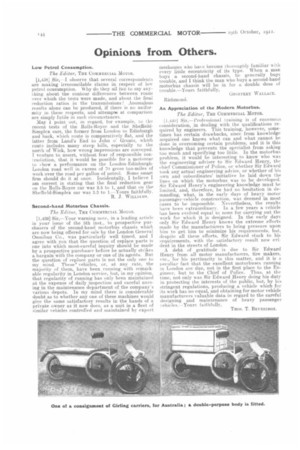Opinions from Others.
Page 18

If you've noticed an error in this article please click here to report it so we can fix it.
Low Petrol Consumption.
The Editor, THE COMMERCIAL MOTOR.
L1,438] Sir,—I observe that several correspondents are making irreconcilable claims in respect of low petrol consumption. Why do they all fan to say anything about the contour differences between roads over which the tests were made, and about the fina,1 reduction ratios in the transmissions ! Anomalous results alone can be produced, if there is no uniformity in these respects, and attempts at comparison are simply futile in such circumstances.
May 1 point out, in regard, for example, to the recent tests of the Rolls-Royce and the SheffieldSimplex ears, the former from London to Edinburgh and back, which route is comparatively flat, and the latter from Land's End to John o Groats, which route includes many steep hills, especially to the non t It of Wick, how wrong impressions are conveyed. I venture to assert, without fear of responsible con; radiction, that it would be possible for a motorcar to i•how a performance on the London-EdinburghLondon road well in excess of 70 gross ton-miles of work over the road per gallon of petrol. Some smart firm should do it at once. Incidentally, I believe I am correct in stating that the final reduction gear on the Rolls-Royce car was 2.5 to 1, and that on the Sheffield-Simplex car was 3.3 to 1.—Yours faithfully.
R. J. WILLIAMS.
Second-hand Motorbus Chassis.
The Editor, THE COMMERCIAL MOTOR.
[1,439] Sir,—Your warning note, in a leading article in your issue of the 5th inst., to prospective purchasers of the second-hand motorbus chassis which are now being offered for sale by the London General Omnibus Co., was particularly well timed, and .I agree with you that the question. of replace parts as one into which most-careful inquiry should be made by a prospective purchaser before he actually strikes a bargain with the company or one of its agents. But the question of replace parts is not the only one to my mind. These' vehicles, or, at any rate, the majority of _them, have been running with remarkable regularity in London service, but, in my opinion. that regularity of running has only been maintained at the expense of daily inspection and careful nursing.in the maintenance department of the company's various depots. In my mind there is considerable doubt as to whether any one of these machines would give the same satisfactory results in the hands of a private owner as it now does, as a unit in a fleet of similar vehicles controlled and maintained by expert
mechanics who Oat e become thoroughly familiar with every little eccentricity of its type. When a man buys a second-hand chassis, he generally buys trouble, and I think the man who buys a second-hand motorbus chassis will be in for a double dose of trouble.—Yours faithfully,
GEOFFERY WALLACE.
Richmond.
An Appreciation of the Modern Motorbus.
The Editor, THE COMMERCIAL MOTOR.
[1,44u] Sir,—Professional training is of enormous consideration, in dealing with the qualifications required by engineers. This training, however, sometimes has certain drawbacks, since from knowledge acquired one knows what can and what cannot be done in overcoming certain problems, and it is this knowledge that prevents the specialist from asking too much and specifying too little. In the motorbus problem, it would be interesting to know who was the engineering adviser to Sir Edward Henry, the chief Commissioner of Police, or whether Sir Edward took any actual engineering advice, or whether of his own and subordinates' initiative he laid down the lines on which the motorbus was to be developed. Sir Edward Henry's engineering knowledge must be limited, and, therefore, he had no hesitation in demanding, what, in the early days of heavy motor passenger-vehicle construction, was deemed in most eases to be impossible. Nevertheless, the results have been extraordinary. In a few years a vehicle has been evolved equal to none for carrying out the work for which it is designed. In the early days only Sir Edward Henry knows the extreme efforts made by the manufacturers to bring pressure upon him to get him to minimize his requirements, but, despite all these efforts, Sir Edward stuck to his requirements, with the satisfactory result now evident in the streets of London.
A debt of gratitude is due to Sir Edward Henry from all motor manufacturers, tire makers, etc., for his pertinacity in this matter, and it is a peculiar fact that the excellent motorbuses running in London are due, not in the first place to the Engineer, but to the Chief of Police. Thus, at the time, not only was Sir Edward Henry doing his duty in protecting the interests of the public, but, by his stringent regulations, producing a vehicle which for its work has no equal, and obtaining for motor vehicle manufacturers valuable data in regard to the careful designing and maintenance of heavy passenger vehicles.—Yours fa ithfully, Tuna. T. BEVERIDGE.
























